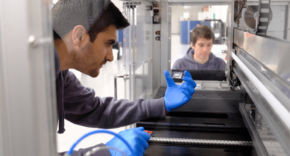One in four (25%) NHS workers believe a robot would be better at decision making than their boss if it had access to the right business intelligence, in contrast to one in three professionals (34%) in all industries. This is according to the new Advanced Trends Survey Report 2018, which also reveals that there is no clear leader in driving technology change within their organisation.
Just 31% of C-Suite/Managing Directors are said to be driving change, while over half (57%) believe responsibility falls to IT and 19% say it’s the job of the finance team. It perhaps comes as no surprise, then, that 76% of employees think less than half of people in their organisation are ready to adopt new technology to change the way they work – 17% higher than employees across all industries when also asked the same question.
The annual survey is the third to be commissioned by British software and services company Advanced, with over 1,000 professionals1 in UK organisations having their say on how British businesses are faring in the digital era. The NHS is under intense pressure to digitally transform as the government plans to digitise its services and make them paperless by 2020. And, just last month, Health and Social Care Secretary Matt Hancock launched his technology vision foroutdated and obstructive NHS IT systems to become a thing of the past.
“Disruptive technology is bringing into question every process required to run a typical NHS organisation,” says Ric Thompson, Managing Director – Health & Care – Advanced. “While robots are unlikely to take on the job of decision maker in the immediate future – the reality is they are simply not suited to such complex tasks and will work side-by-side with humans – our findings suggest that employees are dissatisfied with their current leadership, want to get rid of arbitrary decision making and want to challenge the norms. Leaders need to step up, to provide the clear direction that people need and take charge of the intense technology change happening as a result of the digital era.”
Nearly two-thirds (61%) say they would be happy to work alongside robotic technology if it meant less manual processes – most likely because automation acts as a workforce multiplier, increasing output while reducing time wasted on repetitive and low-skilled activities. The majority (67%) have already adopted technology to automate tasks and processes, albeit many of these are likely using simple commands to handle defined actions.
What’s certain is that there is an appetite among employees for innovative technology, with the right leadership, to play a greater part in augmenting their roles. The report reveals that 31% want to see predictive analytics in their daily working life – on a par with Cloud services – while 30% want to see Business Intelligence (BI) followed by wearable technology (26%) and Artificial Intelligence (AI) (25%) and the Internet of Things (IoT) (24%).2
The fact that many NHS workers want to see disruptive technologies in their daily working life is encouraging and, to some extent, it is already happening today. The Ask NHS mobile app, for example, encourages self-care – saving healthcare staff valuable time. But, while technology will drive productivity and help employees work smarter and not harder, there must be an openness to embrace change from every individual in the workforce if any technology innovation is to succeed in delivering the anticipated business benefits.
Ric adds: “Bosses therefore need to decide who in the organisation is best placed to drive a change in culture and support all employees in any technology transition. This means helping staff understand how innovative technology will enable them to focus on higher value roles – be it through reskilling and training – and how it will positively impact their productivity.
“Ultimately, technology changes the make-up of the workforce, which is why creating an open and collaborative culture is so critical. New candidates in entry-level roles working on the ground are likely to be more digitally savvy so would make great ambassadors to drive change and ensure innovation happens. As a result, NHS organisations will see more people feel open to embracing the change and placing confidence in their leadership.”
The Advanced Trends Survey was carried out online in September 2018. The highlights of the report can be found here: www.oneadvanced.com/trends.










